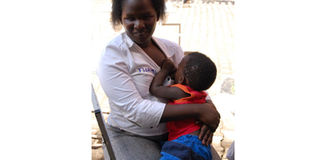A success story in a sea of hardship

Ndagire has managed to rise above disability and the challenges of motherhood with disability and celebrates her one-year-old son who has so far shown amazing perceptiveness to his mother’s condition. PHOTO BY STEPHEN OTAGE
If you hear Florence Ndagire speak, you will be captivated by the sweet lilt in her voice but what stays with you is her eloquence as she engages her audience in an open conversational way. When you look at her, the super smooth chocolate complexion matches her beautiful voice and it takes about a minute to notice that her eyes are not focusing at all. Ndagire is blind, has been so since birth, but she is also a proudly accomplished woman, and most of all a mother of one.
“I was scared of what people would say, how the public would view me when my belly started bulging,” she says of her feelings just at the beginning of her pregnancy. When I ask her how, she gives an example of passing a boda boda stage and the boda bodas exclaiming who did that to you? The programme Officer Lobbying and Advocacy for Uganda Society for Disabled Children (USDC) thinks her experience at mother hood is one of the better ones as compared to what other women with disabilities go through.
From a presentation by Esther Nassali of Nuwodu (National Union of Women with Disabilities Uganda) at the national sensitisation meeting on Maternal and newly born child health among PWD’s, the issue of maternal and child health among people with disabilities is still plagued by a series of challenges. From physical barriers to communication problems for the deaf and blind mothers, women with disabilities have more to grapple with during pregnancy than those without.
Access to maternal beds
As an example, Nassali outlines challenges for those whose limbs are disabled as getting accessing beds and scales when they attend antenatal clinics or report for delivery. Going further, the presentation points out that the disabled are more likely to experience, harassment in labour wards and clinics because of their communication and physical restrictions.
Ndagire had her baby at Kibuli Hospital via Caesarean section and had attended her antenatal sessions both in Kawempe Town council clinic and Kibuli hospitals. She rates both her experiences in the two hospitals as good. “Up to the time, I gave birth, I had a very good relationship with the nurses and midwives. They advised me on everything from what to eat to what to I expected when labour came around,” the law graduate from Makerere University says.
Fathers abscond responsibility
Often women with disability face discrimination and stigma from the communities they live in says Ndagire. While she might not know how these feel like with her strong family backing and friends, she acknowledges that it is hard for a lot of disabled women. Many are left with the children after the fathers abscond all responsibility for fear of societal stigma. “They, (the men) also fear the disability is hereditary or subscribe to popular belief that disabled women are not competent enough as partners.” Ndagire calls these absentee fathers ‘Night husbands’ as they are only around long enough to impregnate the woman and then take off. “While this may seem like a deep rooted problem, advocacy would change a lot of those misconceptions about disabled persons and also cause people to accept both the mothers and the children,” she believes.
Lack of information
While the lack of information before performing a caesarean delivery was one of the problems cited to plague many disabled mother, Ndagire was informed by her doctors about her small pelvis that wouldn’t allow her have a normal delivery. She recalls the doctor’s explanations led her to having the operation by an informed consent. Other disabled mothers accordingly might not have had it so easy, with it emerging from the NUDIPU conference that more times than not, disabled mothers remember prenatal and antenatal visits as an ordeal.
Many disabled persons have little access to sex or reproductive health education, Ndagire went through a pre-counseling session in her early pregnancy and she credits those sessions with easing her misgivings about pregnancy and giving birth. But a host of other disabled girls and women don’t and end up unprepared for pregnancy or motherhood itself. Several cases have been reported of disabled women giving birth to several children without fathers to take care of them.
Ndagire’s joy
Ndagire has managed to rise above disability and the challenges of motherhood with disability and celebrates her one-year-old son who has so far shown amazing perceptiveness to his mother’s condition. “When I am feeding him or reaching out to him and my hand wanders, he guides me. That, and him calling me mommy fill me with immense joy,” Ndagire shares adding, “I’m glad I am perfectly capable of taking and doing everything for my son unlike the thousands of disabled women who are not in the same position to do so.”




